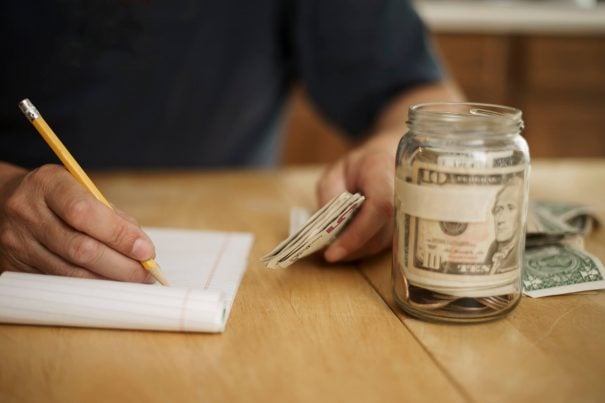Stuff is everywhere. It’s calling out to you wherever you look, saying, “This will make your skin look better than ever!” or “This will give you the energy you need!” or “This will look so good in your home!” They sound so believable in the moment.
But advertisers greatly exaggerate a product’s usefulness while playing on your insecurities. And you pay the price.
So, how do you stop buying stuff you don’t need? And why do you do it?
1. Know Your Triggers.

Those stress-shopping purchases add up. And a big part of avoiding those expenses is to remove the triggers that make them more likely.
Think about the last few times you bought something you didn’t need and ask some questions:
- What were you feeling before and after the purchase?
- What were you trying to escape or to avoid thinking about?
- How long did it take for you to return to your baseline emotional state?
- When you get there, how desperate are you for another high?
- What are your go-to apps, stores, or products?
Only when you know your triggers can you take steps to minimize them.
2. Purge Your Inbox

One of those triggers might be emails with special deals, especially if you’re a bargain shopper. Ask yourself when you’re most vulnerable to promotional emails for products you’re most likely to buy.
Then unsubscribe from all retailer emails — especially those that tempt you with things that look good but that you don’t really need.
3. Go for Quality Over Quantity

Those special “deals” in the seasonal aisle of your local supermarket are usually low-quality items. Chances are, it’s a matter of weeks before they’ll end up in the trash or in a donation box.
Instead, if you really need an item like what you see on those discount shelves, do some research and look for something of higher quality. Instead of trying to get a carload of semi-useful items for less money, focus on finding a few high-quality items that will last.
4. Get Clear on Your Values and Goals

When you know what’s important to you, you’re less likely to shop brands or stores that don’t share your values. Otherwise, it’s too easy to justify taking advantage of every “mega sale” or bargain that shows up in an ad, an email, or in your mailbox.
Get clear on what you want to accomplish this year or in the next three years. Then make it a priority to only support businesses that share your values and support your goals.
5. Find a Support System

Talk to someone about your spending habits and what’s behind them. Get your friends and supportive family members in the loop. Some of them might have some helpful insights on how to stop buying things you don’t need.
Enlist their help in controlling your urges to spend money on things that look tempting in the moment, but that will ultimately end up in the trash bin (or donate pile).
6. Set a Budget and Track Your Spending.

The more conscious you are of the money coming in and going out, the easier it is to see whether you can afford something you want. Unless you’re comfortable with mounting debt, you need to spend less than you earn. Budgeting can help with that.
At the very least, it gives you a detailed breakdown of what you’re earning, what you’re spending, and how you’re spending it. And seeing the impact of your spending (e.g., the mounting credit card bills) can motivate you to take corrective action.
7. Plan Your Shopping

Unplanned shopping is an Achilles heel for most of us, especially when we’re tired, stressed, or in need of a pick-me-up.
If you have a budget set up and know how much you can afford to spend each month, you can plan your fun shopping around the things you want most. Give yourself enough time to consider thoughtfully what items will bring you the most enjoyment.
Set specific days, times, and spending limits, and you’re less likely to go overboard.
8. Find Other Ways to Boost Your Mood

Shopping shouldn’t be the only way you know how to make yourself feel better. Whatever the reason you’re feeling low, consider the following no-cost pick-me-ups:
- Go for a walk.
- Make yourself a favorite food or drink
- Play music that soothes or energizes you
- Take a power nap (not always possible, we know)
- Call or text a friend or supportive family member.
9. Impose a Waiting Period
When you find something you like but don’t really need, force yourself to leave it in your shopping cart for at least three days.
Close the tab or leave the store to get away from temptation. Set a day and time to revisit your cart after those 72 hours are up.
Chances are, your interest in that item will diminish somewhat in favor of new discoveries. If those aren’t necessary, either, impose the same waiting period.
10. Pretend You’re Moving
Take inventory of what you have and separate the stuff you don’t need, use, or love. Use the Marie Kondo method, if that works for you, or take it room by room — as long as you go through everything.
When you finish, take a moment to appreciate your newly decluttered space. And decide what it really needs (if anything) before doing any more shopping.
11. Be Honest About Why You Buy Things You Don’t Need
Most times, when you’re buying things you don’t really need, you’re not thinking about the items in your cart.
You’re thinking about specific changes you want to see in your life or in yourself — whether that’s clearer or younger-looking skin, the attention of your crush, or a chance at a better life.
The more clearly you see what you really want, the easier it is to see how lousy all that stuff is at providing it.

